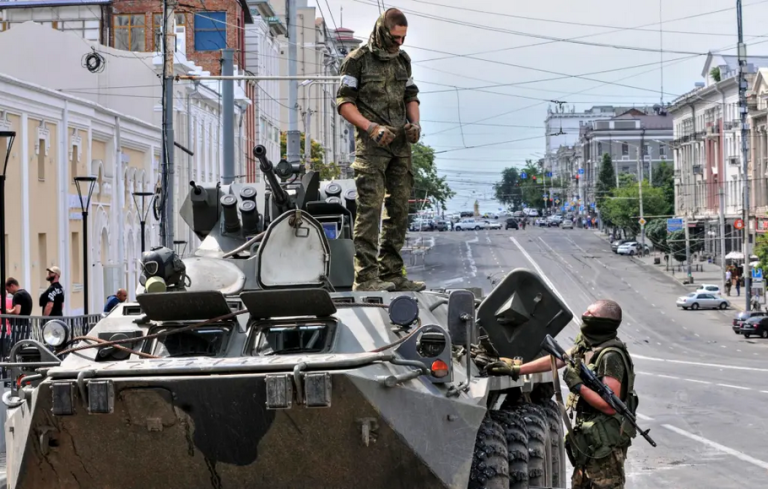2 de julio 2023

“NicaraguAmor” Cultural Caravan for Nicaraguans in the USA

PUBLICIDAD 1M
PUBLICIDAD 4D
PUBLICIDAD 5D
The Cuban regime was cautiously analyzing whether it was better not to attack Prigozhin, lest he become its next ally

Mercenarios de Wagner bloquean una calle en Rostov (Rusia). EFE | Confidencial
We were all in suspense. Last Saturday, June 24, all eyes were directed towards Russia, attentive to the rebellion that led the Wagner group to the outskirts of Moscow and which showed cracks in power in the Kremlin. All the world’s newspapers, the intelligence services and a good part of the people who inhabit this planet spent hours trying to figure out what would happen. But it was the governments and the foreign ministries that lived through the hardest test. In Latin America, the event also served to define positions.
One of the first to show his solidarity with Vladimir Putin on this side of the world was the Venezuelan ruler, Nicolás Maduro. He not only repudiated the offensive of the mercenaries led by Yevgeny Prigozhin, he went further and sent “a hug of solidarity” to the former KGB agent. A similar attitude was taken by the Nicaraguan autocrat Daniel Ortega, who added that within his regime they will “always be following” events that occur in Russian territory. Cuba, meanwhile, was silent.
The silence from Havana lasted long hours, until around nine o’clock at night in Cuba, when Wagner’s armored column had already turned around and Alexandr Lukashenko boasted of having reached an agreement for the withdrawal of Prigozhin and his troops. Only then, the ruler Miguel Díaz-Canel dared to post a message on his Twitter account in which he aligned himself with Putin and condemned the rebellion. Granma newspaper, the official organ of the Communist Party, had not even published –by then– the news of the revolt.
Why so much delay for Díaz-Canel in positioning himself and showing support for Putin? Perhaps they were calculating that if the Kremlin leader fell, it was good for them not to have stood up against his possible successors. Faced with the deep crisis that is plaguing the island, the Cuban regime was cautiously analyzing whether it was better not to attack Prigozhin lest he end up becoming its next ally in Moscow. Rushing to condemn the Wagnerites could complicate a future alliance with them.
The day passed. Most of the world’s governments kept their distance, saying the conflict was an internal matter of Russia and tried to keep their nationals safe in the Eurasian country. The Latin American foreign ministries also took the issue with caution and in most of the public statements by officials the condemnation of the invasion of Ukraine was emphasized. The line that divides the elected executives in the region and the dictatorships became more evident. The Russian crisis served to establish a clear “cordon sanitaire” between Putin’s comrades and the democratic models of the continent.
It also helped the Cuban regime to revive the ghosts of 1991 when its main support and ally, the Soviet Union, imploded. During the hours when Wagner’s rebels advanced towards Moscow, the memories of the fall of that communist giant must have tormented more than one person in Havana’s Plaza de la Revolucion. Then, when they understood that the worst case prognosis had not materialized, they rushed to pat Putin on the back. But the anxiety of losing its ally again hasn’t gone away since then. They have seen the cracks in the Kremlin and they look deep.
This article was originally published in Spanish in Confidencial and translated by Havana Times.
PUBLICIDAD 3M
Filóloga y periodista cubana, apasionada por la tecnología. Es conocida por su blog Generación Y, en el cual hace una descripción crítica de su país. Su blog en un símbolo de libertad de expresión y del uso de la red como vitrina para narrar las realidades de la isla.
PUBLICIDAD 3D